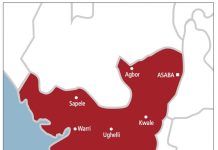Africa-Press – Nigeria. Oil price climbed past $49 per barrel on Thursday, with the optimism of a quicker rebound in demand after the rollout of COVID-19 vaccines moderated a tremendous build in the United States oil stocks, which revealed that supply was still substantial.
The United Kingdom commenced inoculations this week and the U.S could follow suit this weekend. On Wednesday, endorsed its first vaccine, saying initial shots would be delivered from the week ahead, boosting the potential of improvement in oil prices in the near time.
Brent crude, the benchmark for Nigerian oil grades, advanced by 35 cents or 0.7% to $49.21 per barrel at 10:20 West Africa Time, appreciating for the third successive day. US West Texas Intermediate (WTI) crude drifted up by 22 cents or 0.5% to $45.74.
Bonny Light, Nigeria’s premium crude grade, slipped by 51 cents or 1.04% to $48.32 on Wednesday. But Qua Iboe, another key national grade, was up by 47 cents or 0.97% at $48.98 in early trading on Thursday.
Oil prices rose even after the latest weekly report on U.S. oil inventories revealed a monumental 15.2 million-barrel surge in crude stockpile. Pundits had anticipated a 1.4 million-barrel fall.
Tamas Varga of oil broker PVM said “the latest set of data has exceeded any bearish expectations. The stubbornness of oil bulls and their confidence in the positive economic impact of the vaccine roll-out are truly remarkable.”
Worries regarding an attack on an Iraqi oil field also boosted oil prices. On Wednesday, two wells at a small field were blasted but general production from the field was not affected.
“Traders are also nervous about the oil supply,” said Naeem Aslam of Avatrade, hinting at the attack.
Oil prices have recovered from record lows touched in April as the coronavirus hobbled demand, aided by an unprecedented output-cut pact by the Organization of the Petroleum Exporting Countries and allies led by Russia, a cartel called OPEC+.
OPEC+ will go ahead to reduce its supply curbs come January by introducing a further half a million barrels per day of supply, even though the reduction is more gradual than earlier agreed in order to provide more support to the market.
Opinions







